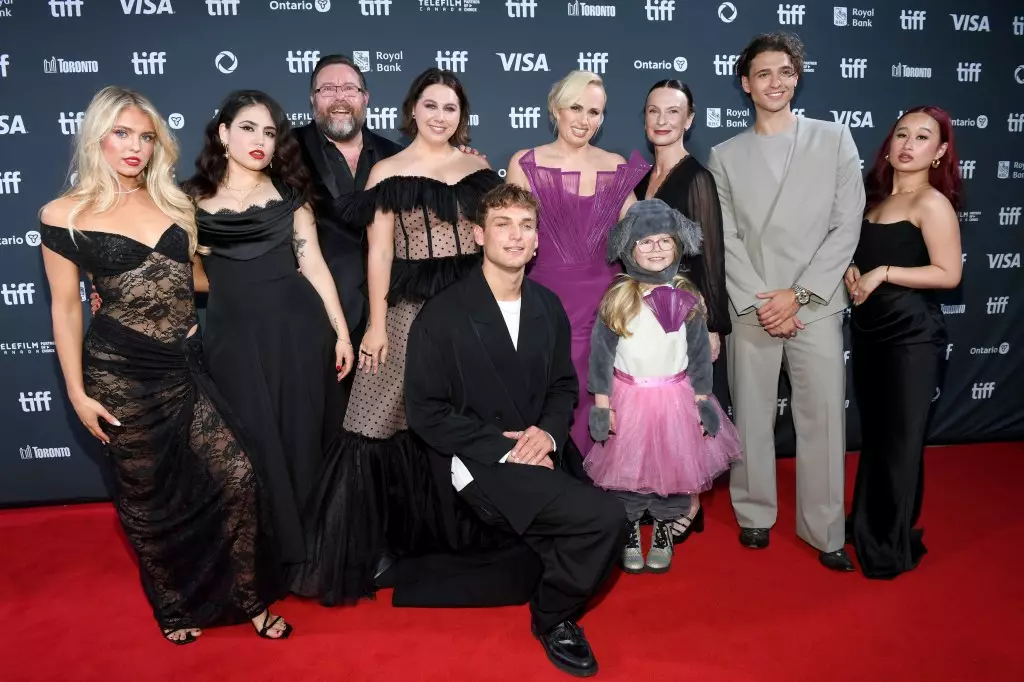The entertainment industry is often perceived as a glamorous world filled with fame and fortune, but beneath its glittering surface lie countless stories of conflict, exploitation, and injustice. Recently, actress and director Rebel Wilson found herself entrenched in a high-stakes legal battle that underscores these realities. After the world premiere of her film *The Deb* at the Toronto Film Festival, Wilson has taken a stand against the film’s producers through a counter-complaint—a bold move that reflects her determination to seek justice not only for herself but also for others who have similarly suffered in silence.
In her counter-complaint filed on September 26, Wilson and her attorney Bryan Freedman paint a grim picture of the producers’ alleged misconduct. Central to this narrative are three individuals: Amanda Ghost, Gregor Cameron, and Vince Holden. Wilson’s filing includes serious allegations, categorizing their behavior as a “troubling pattern of egregious and illicit behaviors,” which ostensibly includes claims of theft, bullying, and even sexual misconduct. The stark language employed by Wilson—referring to the trio as “absolute f*ckwits”—highlights not only her personal frustrations but also hints at a broader issue of accountability and respect in the film industry.
Moreover, Wilson’s assertion that these producers operated under the misconception that they could act with impunity raises critical questions about power dynamics in Hollywood. Too often, individuals in positions of authority exploit their status to intimidate and silence those who dare to speak out against them. Wilson’s decision to bring these issues to light resonates with a growing movement against such abuses and manipulative tactics, which have long plagued the industry.
The legal skirmish began initially during the summer when Wilson publicly criticized the producers for canceling the premiere of *The Deb* at TIFF and handling the film’s finances poorly. Their initial response—characterizing her claims as “false, defamatory, and disappointing”—was quickly met with a defamation lawsuit from the producers themselves. This retaliatory action illustrates a common tactic employed by those in power: attempting to suppress dissent through legal intimidation.
In hiring Freedman, known for his aggressive legal strategies, Wilson signaled her unwillingness to back down. The unfolding drama became more convoluted as Wilson’s counter-complaint detailed the alleged manipulation and intimidation tactics leveraged against her. As Freedman suggests, this represents only the tip of the iceberg, hinting at a wider culture of misconduct that may be unveiled as the case progresses.
This case shines a spotlight on a deeper, systemic issue within Hollywood—the culture that often discourages individuals from speaking out. Wilson’s legal battle resonates with other high-profile cases where individuals have faced severe backlash for revealing misconduct, especially regarding issues of harassment and mistreatment in the workplace. This culture of silence can have devastating consequences, allowing problematic behavior to persist unchecked.
Wilson’s stance not only aims to hold her accusers accountable but also has the potential to encourage other victims to share their stories. The powerful messages she imparts—of resistance against manipulation, oppression, and the call for transparency—echo the sentiments that have gained traction in recent years through movements like #MeToo.
As the legal proceedings unfold, the ramifications of Wilson’s battle extend beyond her personal circumstances. They prompt vital conversations about the treatment of artists within the film industry and the importance of accountability. Wilson’s unwillingness to succumb to intimidation serves as an inspiration to many, signaling a shift toward a more transparent and respectful industry.
This legal struggle is not merely about a film or a few individuals but represents a call for systemic change, rooting out long-embedded injustices and reshaping the entertainment landscape. It invites us to reflect on our complicity in enjoying an industry that often sacrifices ethics for profit, urging both audiences and creators to demand a more just and equitable environment for all. The outcome of this case may very well serve as a decisive moment in the ongoing fight for integrity in Hollywood, reinforcing the truth that silence is no longer an option.


Leave a Reply